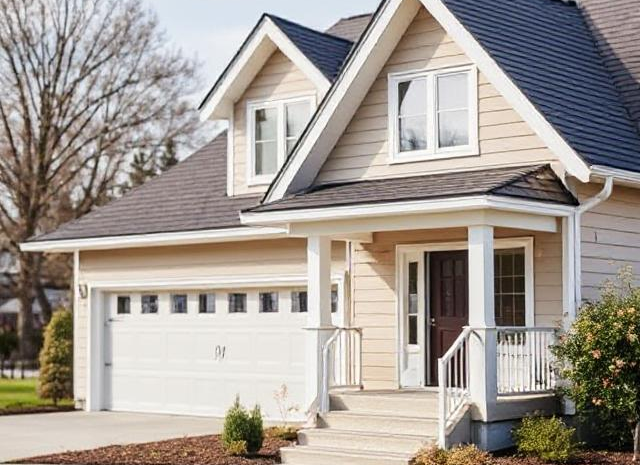
Why Your Home Insurance Premiums Might Increase Unexpectedly
There are several factors that could lead to an unexpected increase in your home insurance premiums. Understanding these factors can help you anticipate potential changes and take proactive steps to minimize cost increases. Here are some common reasons why your home insurance premiums might rise:
1. Increased Risk or Damage in Your Area
- Natural Disasters: If your area experiences an increase in natural disasters (like floods, hurricanes, wildfires, or earthquakes), insurers may raise premiums for homes in high-risk zones. Even if you’re not directly affected, widespread damage in your region can impact everyone’s premiums.
- Crime Rates: An increase in crime, such as burglary or vandalism, in your neighborhood can lead to higher premiums due to the increased risk of theft or property damage.
2. Changes in the Value of Your Home
- Home Renovations or Improvements: If you make significant upgrades to your home (like adding a pool, a new roof, or an addition), the value of your home may increase, which could raise your coverage needs and, therefore, your premiums.
- Rising Construction Costs: If the cost of labor and materials increases in your area (often due to inflation or shortages), your insurer might raise premiums to keep pace with the increased cost of rebuilding your home in the event of damage.
3. Inflation
- General Inflation: Rising costs for goods and services, including building materials and labor, can lead to higher premiums. If inflation causes the cost to rebuild or repair homes to increase, insurers may adjust premiums accordingly.
- Inflation Protection: Some policies include inflation protection, which automatically adjusts the coverage limit based on inflation rates. While this ensures you’re fully covered, it can result in higher premiums.
4. Claims History
- Frequent Claims: If you’ve filed multiple claims over a short period, your insurer might see you as a higher risk and increase your premiums. This includes not only major claims but smaller ones as well, such as those for minor damage or theft.
- Claims in Your Area: Even if you haven’t personally filed a claim, if many homes in your neighborhood have filed claims, insurers may raise premiums for everyone in the area to offset the increased risk.
5. Changes in Coverage or Policy Terms
- Adjustments to Your Coverage: If you increase your coverage limits or add extra protection (such as coverage for high-value items or additional natural disaster protection), your premium will likely go up.
- Policy Renewals: Your insurer might change the terms of your policy at renewal time, leading to an increase in premiums. This could be due to changes in underwriting guidelines or broader industry trends.
6. Changes in Insurance Company Policies
- Company-Wide Rate Hikes: Sometimes, an insurance company may raise rates across the board for all policyholders due to changes in its financial situation or the need to remain competitive in a challenging market.
- Insurance Market Changes: Changes in the insurance market itself, such as increased claims or financial losses for insurers, may lead them to raise premiums to stay profitable.
7. Missed or Delayed Payments
- Late or Missed Payments: If you miss premium payments or make late payments, your insurer might raise your rates or even cancel your policy. Timely payments are important for maintaining your current rates.
- Non-Renewal or Policy Cancellation: If your insurer decides not to renew your policy or cancels it due to missed payments or frequent claims, it may be harder to find affordable coverage, leading to higher premiums with a new insurer.
8. Changes in Credit Score
- Credit-Based Insurance Scores: In many regions, insurers use credit scores as one factor in determining premiums. If your credit score drops, your home insurance premiums may rise because insurers may consider you a higher financial risk.
9. Changes in Building Codes and Local Regulations
- Local Regulation Changes: If your local government updates building codes or mandates more costly construction standards (for example, in response to a recent disaster), your insurer may raise premiums to reflect the higher cost of rebuilding your home to the new standards.
10. Insurance Underwriting Changes
- Changes in Underwriting Guidelines: If the insurer updates its underwriting guidelines to account for a new risk assessment method, such as changes in how properties are valued or new risk factors (like environmental concerns), your premiums could rise.
11. Increase in Deductible
- Deductible Adjustments: If you’ve opted for a lower deductible (or your insurer raises the deductible for your policy), your premiums will likely be higher. A lower deductible means that the insurer will pay out more in the event of a claim, increasing their risk.
12. Unforeseen External Factors
- Industry-Wide Losses: If the insurance industry suffers significant losses from large-scale events (such as natural disasters), it could affect premiums across the board. These events drive up the overall costs of claims and can lead to higher rates.
How to Mitigate Rising Premiums:
- Shop Around: Compare different insurance providers regularly to find better rates or more suitable coverage for your needs.
- Increase Your Deductible: Opting for a higher deductible can lower your premiums (but be sure it’s an amount you can afford to pay out of pocket in case of a claim).
- Review Your Coverage: Make sure you’re not paying for coverage you don’t need or duplicate coverage. Consider whether certain add-ons are essential.
- Improve Home Safety: Installing security systems, fire alarms, or wind-resistant features can make your home safer and potentially lower your premiums.
- Maintain a Good Credit Score: Ensure you’re keeping your credit score in good standing, as it can influence your rates.
Understanding the factors that affect your premiums and staying proactive can help you manage rising costs and keep your insurance affordable.

